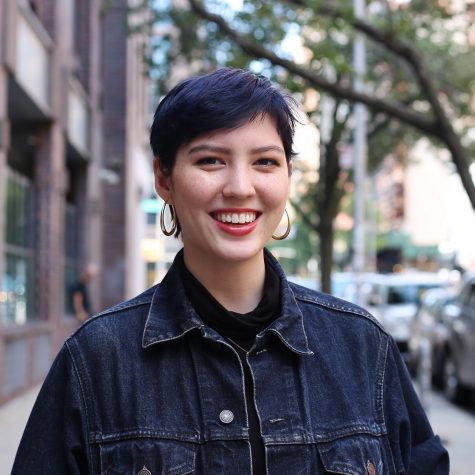Last week, elite gymnastics coach Maggie Haney was served with an eight-year suspension by U.S.A Gymnastics following accusations that she had verbally and emotionally abused athletes. Haney has had at least one gymnast represent the U.S. on the junior or senior level every year since 2013, according to the New York Times.
Laurie Hernandez, the youngest member of the Final Five that won gold at the 2016 Summer Olympics in Rio de Janeiro, opened up about Haney’s abuse in a vulnerable Instagram post on Thursday.
“She’d humiliate me in front of others without a doubt, constantly make comments about me gaining weight, have me work out on multiple injuries, curse at me, point out the way I cried in front of others, and much more that goes beyond my own words,” Hernandez wrote.
U.S.A Gymnastics’ ruling came after an independent hearing panel determined that Haney had emotionally and verbally abused gymnasts. According to Hernandez’s mother, Wanda Hernandez, reports of Haney’s behavior were brought to USAG’s attention in 2016. It took three years and four months for the hearing to happen.
While the process took far too long, some gymnasts see the outcome as a small sign of progress — Haney’s eight-year suspension is certainly more than nothing, and perhaps it also demonstrates that U.S.A Gymnastics understands that emotional abuse is equally as serious as physical crimes.
The news of Haney’s suspension comes just three years after the Dr. Larry Nassar sexual abuse scandal, the effects of which still haunt many gymnasts today. Simone Biles, Gabby Douglas, McKayla Maroney and Aly Raisman are some of Nassar’s more prominent victims. Biles and Raisman have publicly discussed their struggles with anxiety, depression and symptoms of post-traumatic stress disorder, and Raisman retired from gymnastics earlier this year, citing a personal goal to make the sport safer.
Nassar was a former team doctor for the U.S. Gymnastics team and Michigan State University. He was sentenced to more than 100 years in prison after pleading guilty to three counts of criminal sexual misconduct of his patients.
Not only did U.S.A Gymnastics fail to put an end to Nassar’s abuse for years, it knowingly failed to inform authorities of abuse by coaches at all levels, per a 2016 Indianapolis Star investigation — despite laws in every state requiring people to report suspected child abuse.
Last summer, a Senate panel lambasted the national gymnastics federation after conducting an 18-month inquiry which yielded that the U.S. Olympic & Paralympic Committee and U.S.A Gymnastics “knowingly concealed abuse by Larry Nassar, leading to the abuse of dozens of additional amateur athletes from summer 2015 to September 2016.”
So how can Nassar’s victims and others trust the nation’s gymnastics federation?
This cycle of abuse and overt negligence by the very institutions that are supposed to govern and protect their athletes is apparent in almost all sports — not just gymnastics.
There was the 2011 sexual abuse scandal involving former Pennsylvania State University defensive coordinator Jerry Sandusky and 10 of his football players. Several officials at the university had been informed of the incidents and failed to report them to the authorities, enabling further abuse.
Just last month, the New York Times reported that the U.S. Tennis Association knew that prominent youth tennis coach Normandie Burgos had been accused of sexually abusing players for years. He was licensed by the USTA and had received funds from the organization. But the organization failed to take any sort of public action against him. Burgos was convicted of 60 counts of child molestation last year and is currently serving a 255-year prison sentence. Stevie Gould, a victim of Burgos’ who once tried to warn the USTA of the abuse, was presented with a national sportsmanship award by the USTA around the same time he was set to testify in Burgos’ criminal trial.
In sports, athletes are expected to form strong relationships with their coaches and physical trainers. Budding gymnasts, football players and tennis stars spend the most amount of time with these authority figures. They have to trust them with their bodies and their minds. But what happens when coaches and doctors use that level of trust to manipulate and abuse their athletes? And how can these athletes trust the very sporting institutions that were created to oversee and protect them after those governing bodies have proven themselves to be unworthy of that faith?
To break the cycle of abuse, large sporting federations like U.S.A Gymnastics, the USTA and the U.S. Olympic & Paralympic Committee need to be held accountable for the behavior of their coaches and staff. They also need to develop stronger safeguards to protect their athletes against future abusers.
After the Nassar scandal shocked the world, U.S.A Gymnastics experienced a period of turnover and turmoil.The organization’s president, Steve Penny, resigned in 2017, and the federation has hired three new executives in the last three years.
Following the Senate panel’s inquiry, the Senate introduced a bill which would increase the legal liability for the USOPC and its sport-specific governing bodies, including U.S.A Gymnastics. It also increased the funding for the Center for SafeSport, an independent, nonprofit organization created to end abuse in sports. The bill has not yet been passed.
While a number of independent investigations have been conducted about the abuse, an investigation into who within the U.S.A Gymnastics specifically chose to protect Nassar — which Biles and Raisman have called for — has not yet transpired. The pair were disappointed by the federation’s proposed settlement offer, which included $215 million to the victims but also suggested the release of Penny, former coaches Martha and Bela Karolyi and others from liability.
While the suspension of Haney from the sport may serve as a small consolation, an insufficient settlement offer and a lack of transparency leave athletes feeling dismayed and alone. The question remains: can U.S.A Gymnastics be trusted to handle — or, at the very least, report — abusers within its structure?
The Sports Girl is a weekly column that features a girl’s take on sports. Yes, a girl. Yes, on sports.
Correction, May 6: This article previously misstated the involvement of the Center for SafeSport. This article has been updated and WSN regrets any errors.
A version of this article appeared in the Monday, May 4, 2020 e-print edition. Email Bela Kirpalani at [email protected].


















































































































































Jmac • May 4, 2020 at 1:18 pm
The end of an era! Great column, Bela :’)